- 2019-10-28
- ㆍ
- 2789
〈Session 2 - “Earth Jurisprudence and Earth Justice Theory”〉
The second day of the PLZ Forum, September 21, focussed on "International Proliferation of Earth Jurisprudence and Earth Justice," and began with a presentation by Maria Sanchez, coordinator of the UN Harmony with Nature Programme, entitled "Harmony with Nature and the Proliferation of Earth Jurisprudence." Ms. Sanchez detailed how the Harmony with Nature Programme started and how it has grown internationally in the last decade, and she stressed that a key element of the Harmony with Nature Programme is everyone in the world learning the importance and responsibility of protecting Mother Earth. The audience was impressed by her desire to play a role in facilitating change and education such that human society would eventually live in harmony with the Earth and coexist with nature. Following the presentation, discussions were held with Yeonhee Park, director of the ICLEI Korea Office, Young Ju Lee, attorney at law at One Law Partners, LLC, and Yunjeong Han, director of EcoCiv Korea.
〈Highlight of Day Two〉
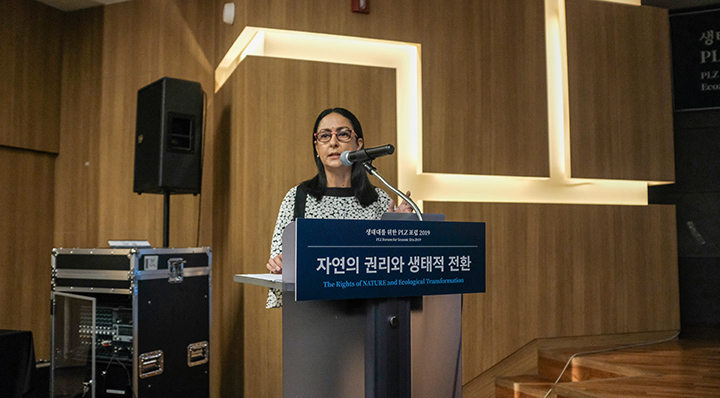
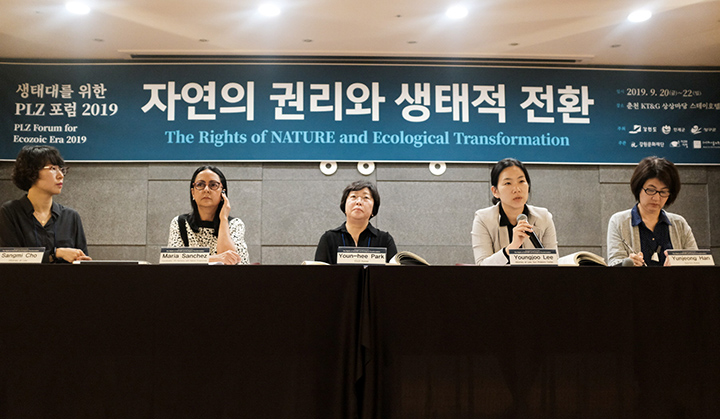
---------------------
〈Session 3 - “The Rights of Nature and the Future of the DMZ”〉
In the third session, under the theme "Rights of Nature and the Future of the DMZ," Ri Jin, professor at the Yanbian University Geography and Ocean Science Academy, gave a special speech entitled "Study on Ecology Safety Assessment and Sustainable Management of Wetlands in the Tumen River Basin." He gave a detailed description of the wetland environment in the Tumen River border region, and introduced the process of accumulating data and tracking its ecological changes. In the next presentation entitled "The Role of the Army in the Conservation of Ecology and Heritage in the DMZ", Colonel Dosun Kim, an environmental researcher at ROK Army Headquarters, emphasized the role of the military as the main agent for preserving and protecting the DMZ's ecology. In addition, Colonel Kim described a detailed proposal to the military to identify damage in the DMZ, identify the causes of the damage, conduct ecological surveys using military facilities, and present commendations to troops who excel in these areas. Jaechul Seo, a standing member of Green Korea, gave a presentation entitled “Preserving the DMZ as a World Heritage Site” in which he detailed an preservation plan for the 248 km ecological axis that is the DMZ. Mr. Seo emphasized that as the DMZ is both a world heritage site in terms of ecology and also a world heritage site because of its Cold War history, it would hold great significance as a UNESCO World Heritage site. Finally, in their joint presentation entitled "Proposal for Legal Reality and Rights of Nature in the DMZ," Hyejin Jung and Bohyun Ham, attorneys at law, introduced the legal realities and limitations of the DMZ, described how to transform the armistice agreement into an internationally governed system, and gave examples and implications of New Zealand granting legal personhood to rivers and the natural environment.
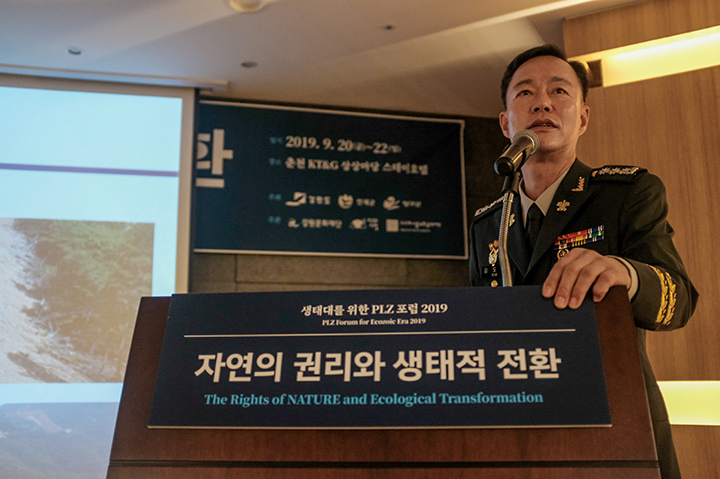
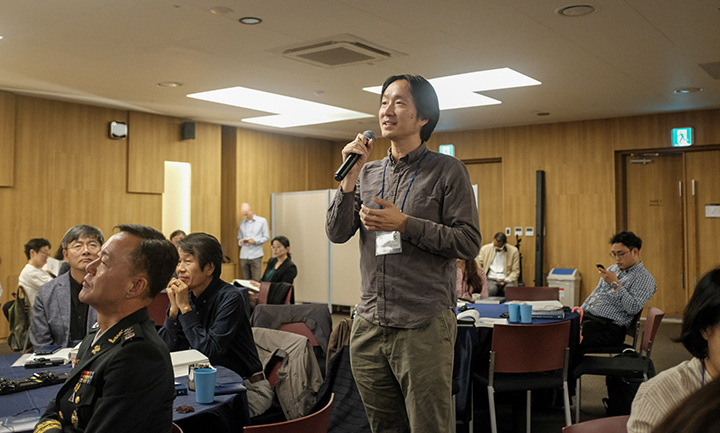
-------------
〈Session 4 - “Climate Change and Our Future”〉
Session Four, entitled “Climate Change and Our Future,” began with a special speech by Won-Tae Kwon, director of the APEC Climate Center. In her speech "Asia's Climate Change Challenges," Dr. Kwon introduced data and described the current status of climate change in detail, emphasizing the need for changes in policy, technology, and perceptions in areas such as greenhouse gas reduction policy, energy technology development, and social awareness. In the following special talk, Woo-seok Kong, professor at Kyung Hee University, Wang-Bae Kim, professor at Yonsei University, and Cheon-ho Cho, professor at Kyung Hee Cyber University discussed specific actions to respond to climate change and future life.
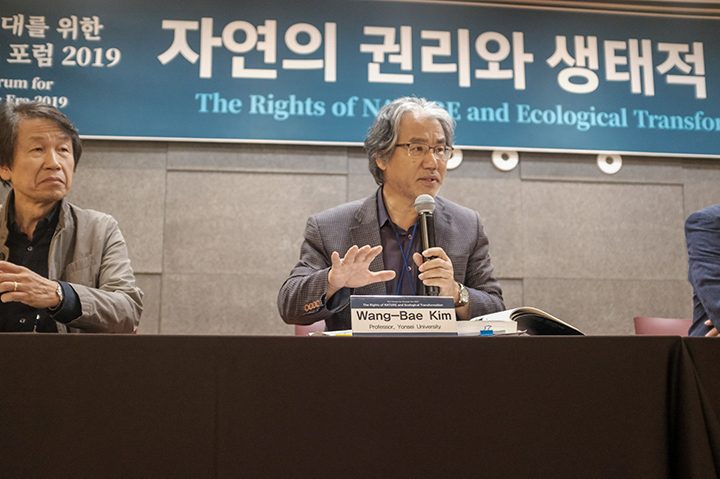
-------------
〈Session 5 - “Climate Crisis and Creating the Earth Community Together – Across the Generations”〉
In Session Five, the presenters shared the achievements of various sectors in response to the climate crisis under the theme "Climate Crisis and Creating the Earth Community Together - Across the Generations." The Environmental Law Association of the Kangwon National University School of Law, the Youth Climate Change Network, BigWave, and People for Earth’s youth group Small Questions shared their experiences and their visions of overcoming the climate crisis.
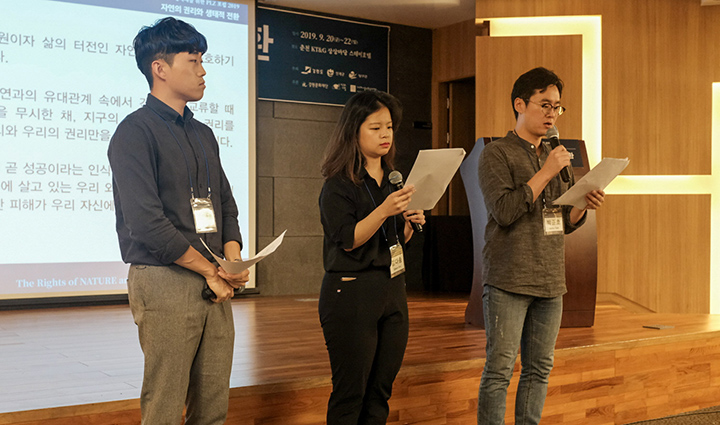
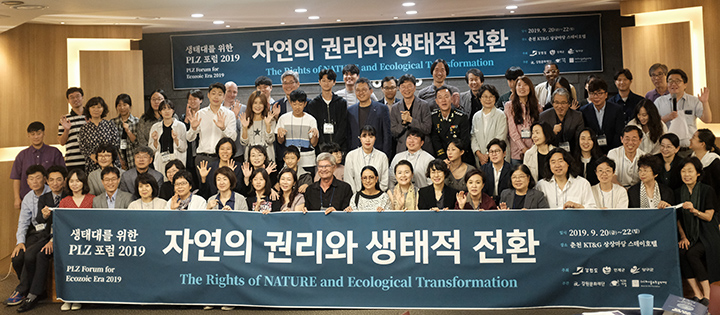
Following this, cooperation between People for Earth and the UN Harmony
with Nature Programme was discussed. Hyejin Jung, director of the Earth
Jurisprudence Center of People for Earth and Maria Sanchez, coordinator of UN
Harmony with Nature Programme, talked about partnership ideas such as combining
and sharing earth jurisprudence lecture series, inviting judges from Latin
America who are in the Harmony with Nature Expert Network, and more. It was
decided that further discussions would be held between the two parties in the
near future.
Declaration of Lawyers Calling for the Government to Recognize Reality and Take Action on the Climate Crisis
We are living in an age that has gone beyond climate change, namely the Age of Climate Crisis. It is now not just an empty warning but rather an undeniable reality that we humans are addicted to the reckless use of fossil fuels and uncontrolled development, and are facing a self-caused extinction of not only ourselves but of all creatures on this planet. We, members of the legal profession, with the weighty mission of advocating for human rights and realizing social justice, recognize that human rights and justice are inseparable from global climate and environmental issues. Although we human beings are closely connected to the environment as part of the global ecosystem, we have neglected this obvious truth and pursued greed instead. As a result, the foundation of life itself is falling apart. Last year, the Intergovernmental Panel on Climate Change (IPCC) revealed that if we continue to emit greenhouse gas following the current trend, by 2040 the global average temperature will rise by 1.5°C compared to that before the age of industrialization, resulting in catastrophic changes in the global environment that will be beyond recovery. Others argue further that, to avoid great catastrophes, we must take concrete and specific actions aiming for “carbon neutrality” which keeps the actual carbon dioxide emissions at net zero by balancing out emissions and absorption. Greta Thunberg, a Swedish teenage environmental activist, sharply criticized world leaders at the UN Climate Summit on September 23, saying, “You have stolen my dreams and my childhood with your empty words.” The fear of the climate crisis and the criticism of the older generations for their inaction are spreading across the borders and generations. Korea is no exception. On September 21, 330 groups from all walks of life held the “September 21 Climate Crisis Emergency Action” rally in Seoul as part of the “Global Strike” which was joined by people from 139 countries. Also, on September 27, teenagers who share concerns about the climate crisis are planning to refuse to attend school and hold an “School Strike for Climate” in Gwanghwamun, Seoul. As members of the older generation, we humbly accept the criticism from these young people. In particular, as members of the legal profession, we deeply regret our failure to play a role in promoting the happiness and sustainable lives of our communities and their members. Now, in response to the climate crisis, all members of society must put our heads together, formulate concrete strategies, and execute them thoroughly. To this end, the government's role is crucial in drawing a social consensus and setting policy measures. However, our government is still not squarely facing up to the reality of the climate crisis. Rather, it is taking a lukewarm stance, compromising the future of our young generation. The growth rate of CO2 emissions in Korea is the highest among the OECD nations, and its greenhouse gas emission is the seventh highest in the world. In order for the world to achieve its “1.5℃ target”, we need to reduce 45% of the greenhouse gases by 2030 from the 2010 level. The Korean government stated that it would reduce its emissions by 37% from the business-as-usual level by 2030. However, in actuality, this plan will stop at reducing the emissions by only 15% from the 2010 level. The Korean government's level of awareness and its response to the climate crisis fail to meet the domestic and international expectations and demands. The crisis is clearly and presently progressing. According to the Global Climate Report by the World Meteorological Organization, over the last five years the global average temperature has risen by 0.2 degrees Celsius, the hottest period in history has been recorded, and the average sea level has risen by an average of 5mm a year, the highest in the past 20 years. The pace of climate change in Korea has exceeded the global average. The crisis is not just expressed in the form of numbers and statistics. Throughout all regions of the world, including Korea, all living beings and Earth are suffering from abnormal weather events, heat waves, pest outbreaks, and biodiversity loss. In particular, the problem of environmental injustice is becoming more severe among the socially vulnerable class, harmed more gravely by the climate crisis. We urge the Korean government to accept the reality of the climate crisis as it is and to come up with more effective and concrete action plans. The government must make every effort to prepare for the transition to, and achieve a social consensus for, an ecological civilization, as well as make the climate crisis a priority policy issue and fundamentally reexamine the energy and industrial policies from an ecological perspective. To this end, we urge the Korean government to immediately legislate proper laws and reorganize its systems so that action can be taken as quickly as possible. Signed by: Lawyers calling for the government to recognize reality and take action on the climate crisis |
At the end of the PLZ Forum, the presenters and session chairs of Session
Five announced
the "Youth Declaration for Rights of Nature and Ecological
Tranformation."
We stand here in defense of the rights of Nature, the source and place of life. The principle that our lives are sustainable only when we interact closely and bond strongly with Nature has been ignored. Instead, our lives have been focused on protecting human ethics and human rights. Recognizing economic development and wealth accumulation as equivalent to success, we have excessively damaged our ecosystems and destroyed other creatures’ habitats on Earth. As a result, we are facing a climate crisis as the damage is coming back on us. We gather here today and see this as a crisis we cannot afford. However, not all members of our society are aware of the current crisis. Our education system does not teach that protecting the rights of Nature is a matter of survival and is more important than individual success and human development. This crisis must be overcome not only from a scientific standpoint but through an ecological shift based on the ethics of the Earth. Our education should recognize that our attitude toward human ethics is derived from human ignorance and arrogance, and should adopt global ethics as the foundation of the philosophy of education. We must know that we have neither the right nor the freedom to destroy the ecosystems of all living and nonliving things on Earth. In order to overcome the climate crisis we must foster the voluntary and active participation of all generations, including children and youth. There is an urgent need for education to secure the thinking and the abilities necessary to respond to threats to the climate and Nature. Education for ecological transformation in our society should be long-term and sustainable, neither temporary nor mere formality. Escaping from the logic of development and growth, it is time to establish an education system to preserve the rights of Nature and ecosystems. We would like to strengthen and share these values and this system of education with the world across the generations. September 21, 2019 Heejung Yim Director of Namu Mediia Da Bin Kim Director of NatureGraphy Dasom Kim Environmental Law Society of Kangwon National University School of Law Junho Park Small Questions (Youth Group of People for Earth) |
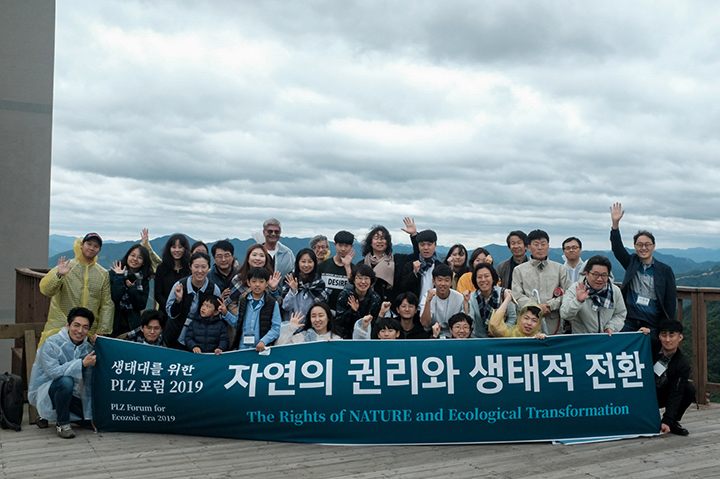
On September 22, the last day of the forum, about 50 participants visited
Hwacheon's Chilsung Observatory, one of the DMZ ecological trails. This eco-excursion,
led by Jae-chul Seo from Green Korea, was a great opportunity to see and feel
the nature of DMZ's conservation values and the rights of nature while looking
directly at the DMZ’s nature healed by nature itself in the area of the Civilian
Control Line.



